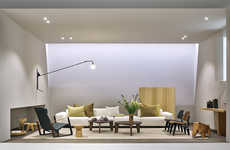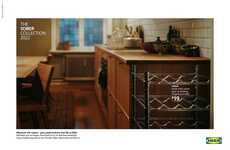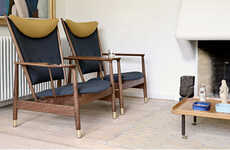
Homebox's 'The Hidden Collection' is Dedicated to Domestic Workers
Tahaab Rais — August 3, 2022 — Art & Design
References: homeboxstores
Middle Eastern furniture brand Homebox has announced the launch its socially progressive 'Hidden Room Collection.' Research across the Middle East reveals that 94% of homeowners keep one room hidden when taking guests on tours of their home: the room assigned to domestic workers. It is a segment that the home furniture and furnishing category, in general, has always been left out of their collections.
Expat domestic workers are employed in many homes in the Middle East, often working for years for the same families, living away from their own families. They come from all over the world. But while they work in towering skyscrapers and big villas, their rooms remain very small spaces – typically 7 feet x 10 feet, but sometimes even smaller. These rooms are often furnished with second-hand or third-hand furniture, mismatched, worn out, or dingy.
Home Box is a furniture and home furnishings brand in the Middle East, with stores across UAE, Saudi Arabia, Bahrain and Qatar. While Home Box can’t change the size of living spaces assigned to domestic workers, with its smart living solutions, Home Box can help to transform these spaces, so people feel at home in the homes they work in.
Inspired from this insight, 'The Hidden Room Collection' was created. It’s a specially curated collection, designed in collaboration with Home Box’s design team, that provides beautifully designed and customized adaptable furniture and furnishing items for the small spaces where domestic workers live.
To launch this new business line, a short film has been produced. The film features real workers based in the Middle East, each with their own story. Its premise was inspired by another data point: 329 domestic workers were asked about their favorite place in the homes they work in, and out of all the places they spoke about, one remained unmentioned – their own "hidden" room. The film, framed intentionally in an aspect ratio of 1.33:1, creates the boxed-up feeling that they feel in their constrained and restrictive living space.
Expat domestic workers are employed in many homes in the Middle East, often working for years for the same families, living away from their own families. They come from all over the world. But while they work in towering skyscrapers and big villas, their rooms remain very small spaces – typically 7 feet x 10 feet, but sometimes even smaller. These rooms are often furnished with second-hand or third-hand furniture, mismatched, worn out, or dingy.
Home Box is a furniture and home furnishings brand in the Middle East, with stores across UAE, Saudi Arabia, Bahrain and Qatar. While Home Box can’t change the size of living spaces assigned to domestic workers, with its smart living solutions, Home Box can help to transform these spaces, so people feel at home in the homes they work in.
Inspired from this insight, 'The Hidden Room Collection' was created. It’s a specially curated collection, designed in collaboration with Home Box’s design team, that provides beautifully designed and customized adaptable furniture and furnishing items for the small spaces where domestic workers live.
To launch this new business line, a short film has been produced. The film features real workers based in the Middle East, each with their own story. Its premise was inspired by another data point: 329 domestic workers were asked about their favorite place in the homes they work in, and out of all the places they spoke about, one remained unmentioned – their own "hidden" room. The film, framed intentionally in an aspect ratio of 1.33:1, creates the boxed-up feeling that they feel in their constrained and restrictive living space.
Trend Themes
1. Socially Progressive Furniture - Furniture brands can create socially progressive collections that address the needs of overlooked segments of the population, such as domestic workers.
2. Smart Living Solutions - Furniture brands can leverage smart and adaptable solutions to transform small living spaces, improving the living conditions of domestic workers and increasing customer satisfaction.
3. Inspiring Storytelling - Creating compelling short films that highlight social issues can raise awareness and promote the growth of socially responsible brands in the furniture and furnishing category.
Industry Implications
1. Furniture and Home Furnishings - Furniture and home furnishings brands can create collections that address the needs of overlooked segments of the population by providing products tailored to their specific living conditions.
2. Hospitality - Hospitality companies can improve the working and living conditions of their domestic workers, providing a more human-centric approach to their operations and increasing customer satisfaction.
3. Social Responsibility - Companies committed to social responsibility can leverage their values to create products and services that promote more equitable and inclusive societies, generating positive impact on communities and the environment.
3.7
Score
Popularity
Activity
Freshness
















